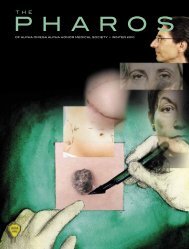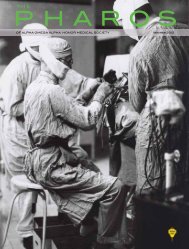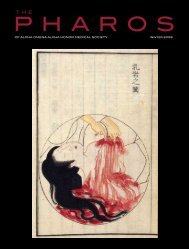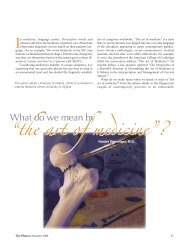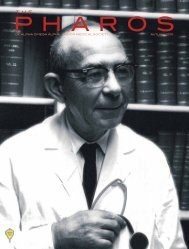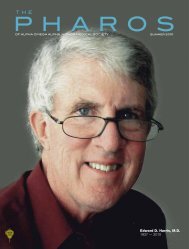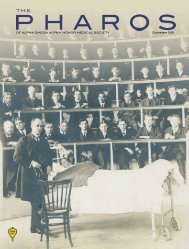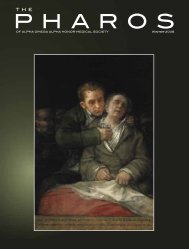The Pharos - Alpha Omega Alpha
The Pharos - Alpha Omega Alpha
The Pharos - Alpha Omega Alpha
You also want an ePaper? Increase the reach of your titles
YUMPU automatically turns print PDFs into web optimized ePapers that Google loves.
Is there a Doctor Hertzler in the house?<br />
Dr. Hertzler and local children. Courtesy of the Learning Center for Health, Halsted, Kansas (www.learningcenter.org).<br />
doctor always knew best and that knowing<br />
best often required concealing the<br />
truth from patients. In serious or fatal<br />
illness, he argued, truthfulness conflicts<br />
with the physician’s duty to do no harm,<br />
because it diminishes the patient’s hope:<br />
“<strong>The</strong> most disastrous results may follow<br />
a tactless warning.” 1p307 <strong>The</strong> physician<br />
should therefore manipulate the truth,<br />
or, if necessary, tell outright lies about<br />
the patient’s condition.<br />
<strong>The</strong> Horse and Buggy Doctor was<br />
written in 1938, but most American<br />
physicians shared these beliefs into the<br />
1960s; only in the ensuing decades did<br />
a radical change occur. 3–5 Hertzler’s<br />
practice adhered closely to the original<br />
1847 AMA Code of Ethics, which stated<br />
in part, “<strong>The</strong> life of a sick person can be<br />
shortened not only by the acts, but also<br />
by the words or the manner of a physician.<br />
It is, therefore, a sacred duty . . . to<br />
avoid all things which have a tendency<br />
to discourage the patient and to depress<br />
his spirits.” 6 He would have been dumbfounded<br />
by statements in the AMA’s<br />
current Code of Ethics requiring doctor<br />
to be honest in all professional interactions<br />
and respect the rights of patients. 7<br />
Nor would the horse-and-buggy<br />
doctor find himself at home in today’s<br />
coed medical environment. His striking<br />
misogyny to some extent reflected<br />
mainstream medical beliefs of the early<br />
twentieth century that viewed women<br />
quite literally as the weaker sex, but Dr.<br />
Hertzler went beyond the call of duty in<br />
his anti-feminine rhetoric. He wrote that<br />
women’s complaints were largely “due to<br />
maladjustments between the biologic<br />
and the ethical.” 1p138 Moreover, he considered<br />
the gynecologist “an unfortunate<br />
individual whose mission in life it<br />
is to aid the human female to correlate<br />
her biologic instincts with the dictates<br />
of Christian ethics.” 1p135 In Hertzler’s<br />
mind, misdirection or frustration of the<br />
woman’s animal urge produced dysmenorrhea,<br />
vomiting, and gastric distress.<br />
But she was in a double bind: a woman<br />
who actually expressed her animal urge<br />
developed even worse medical problems.<br />
Marriage was undoubtedly the<br />
healthiest compromise, given the gender’s<br />
sorry lot. Yet marriage brought<br />
its own difficulties, including self-pity,<br />
overeating, and under-exercise. He also<br />
warned against female “alimony hunters,”<br />
who “can be diagnosed at a glance<br />
by an experienced practitioner . . . <strong>The</strong>y<br />
have faces that would congeal boiling oil<br />
in August.” 1p144<br />
This kindly country doctor summarized<br />
his gender-related wisdom<br />
in a series of trenchant observations<br />
like “<strong>The</strong> best cure for a neurotic<br />
woman is to marry a profligate and<br />
drunken husband,” 1p151 and “<strong>The</strong><br />
jealous woman nearly always has a<br />
20 <strong>The</strong> <strong>Pharos</strong>/Autumn 2012



